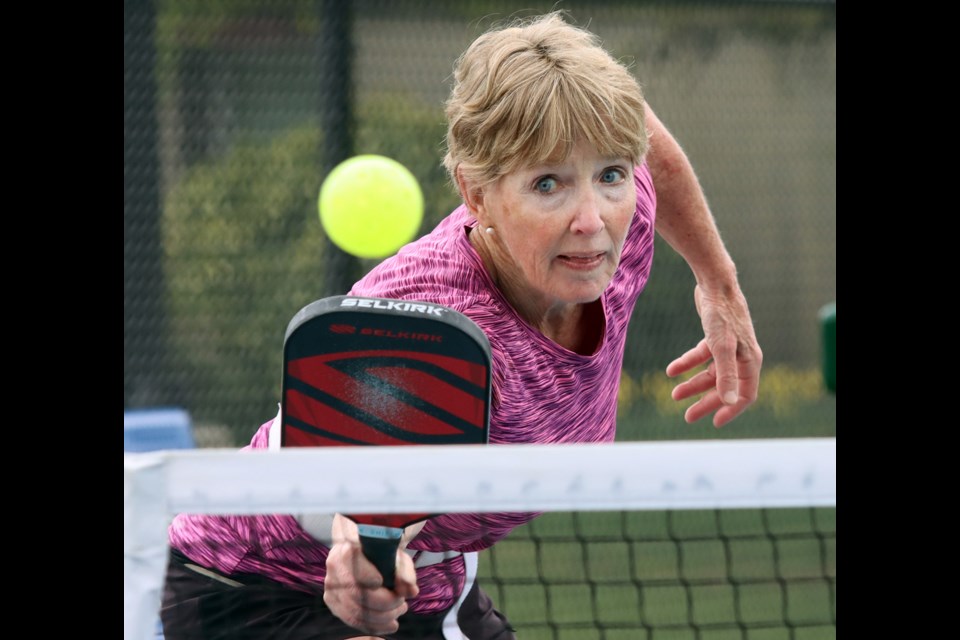Pickleball’s promoters like to say it’s the “fastest-growing” sport in North America. But the trimmed-down version of tennis that uses a smaller court and lower net to make it more friendly for less-agile players has a problem.
It makes a racket.
Recently, Port Moody council directed city staff to remove pickleball lines from the tennis courts at Chestnut Way Park and begin the process of finding another suitable location after neighbours complained they are under siege from the daily staccato of matches.
One of those neighbours, Brian Krieger, told councillors since the city painted lines for six pickleball courts on the tennis courts at the small 2.43-acre park, they’ve been subjected to an almost-daily barrage of noise disruption from the hard paddles striking the plastic whiffle ball that are the sport’s implements of choice.
“These games are loud, and the courts are far too close to the neighbours,” Krieger said.
In fact, he even produced results of a study by Spendarian & Willis Acoustics and Noise Control, of Tuscon, AZ., that’s worked on noise abatement projects for pickleball courts. It said the “impulsive” sound of racquets striking balls creates stress, fatigue and anxiety that can affect concentration, and the ability of people to relax or sleep.
Beverly McQuitty, another resident, said the sound of a pickleball game in progress is harsher and much more disruptive than the soft thwack of a tennis match.
“Pickleball is a very different noise,” she said, “a sharp noise that’s disturbing everybody.”
Councillors were sympathetic.
Coun. Diana Dilworth said while staff may have had good intentions to meet demand for the sport by adding pickleball markings to the tennis courts at Chestnut Way Park, with more people staying at home all day because of the COVID-19 pandemic, she could understand the intrusiveness of the noise games generate.
Port Moody’s city manager, Tim Savoie, admitted the neighbours’ noise complaints caught staff off-guard.
“We didn’t anticipate the neighbours being upset,” he said.
Julie McRitchie, the president of the PoCoMo Pickleball Club, concedes the sport’s noise can be disturbing to some people. She said the sport is growing so fast, it’s often a challenge to find suitable places to play away from nearby homes, especially as indoor options at community centres have been restricted by public health closures to limit transmission of COVID-19.
She said while pickleball was once perceived as a sport for older players because it doesn’t require as much mobility to get around the smaller court, younger players are also discovering its competitive and fitness benefits.
“It’s becoming more all-ages,” she told the Tri-City News. “Youth development is gaining a lot of ground.”
That means players require more places to play.
McRitchie said the 80-member club is working with the communities in the Tri-Cities to get more pickleball courts, including a pilot project at Coquitlam’s Blue Mountain Park that converted some tennis courts to pickleball markings. Players can also bring their own portable nets to play at local outdoor lacrosse boxes.
But those are just stopgap solutions, McRitchie said. And sometimes they can lead to conflict, such as the noise complaints around Chestnut Way Park or resentment from tennis players about losing some of their space.
McRitchie said the ultimate goal of her club would be a dedicated facility like one in Vernon that was mostly funded by the 500 members of that city’s pickleball association. The $745,000 complex features 12 courts for the exclusive use of pickleballers, plus an additional two for practice or tournament play. In March, a steel and fabric roof was erected at a cost of $1.4 million to allow all-weather play.
But, McRitchie said, such a facility is still a dream for local players, as her club was just formally incorporated as a non-profit society in January.
Meanwhile, the sport knows it has a problem. Neighbours of pickleball courts in Newport Beach, Calif., and Charleston, S.C., have filed lawsuits over its disruptive sound.
Pickleball defenders have countered with decibel tests of their own that show the sport is no louder than a tennis match. But with up to four courts able to fit into the space normally occupied by a single tennis court, the sound can multiply, especially if all the courts are busy.
Solutions have included the erection of sound dampening mats on the fences that surround courts. As well, some manufacturers have developed quieter paddles.
But Port Moody’s Irene Mah, a sponsored player who’s also a pickleball ambassador, said “players buy paddles based on performance, rather than the noise they create.”
Up at Chestnut Way Park, the pickleball lines will soon be gone from the tennis courts, and signs erected advising players move elsewhere — perhaps North Shore Community Park near Heritage Woods secondary school, which will be investigated by staff as a possible new location for the sport.
Mayor Rob Vagramov said the city’s learned a lesson.
“Sometimes there are unintended consequences.”



